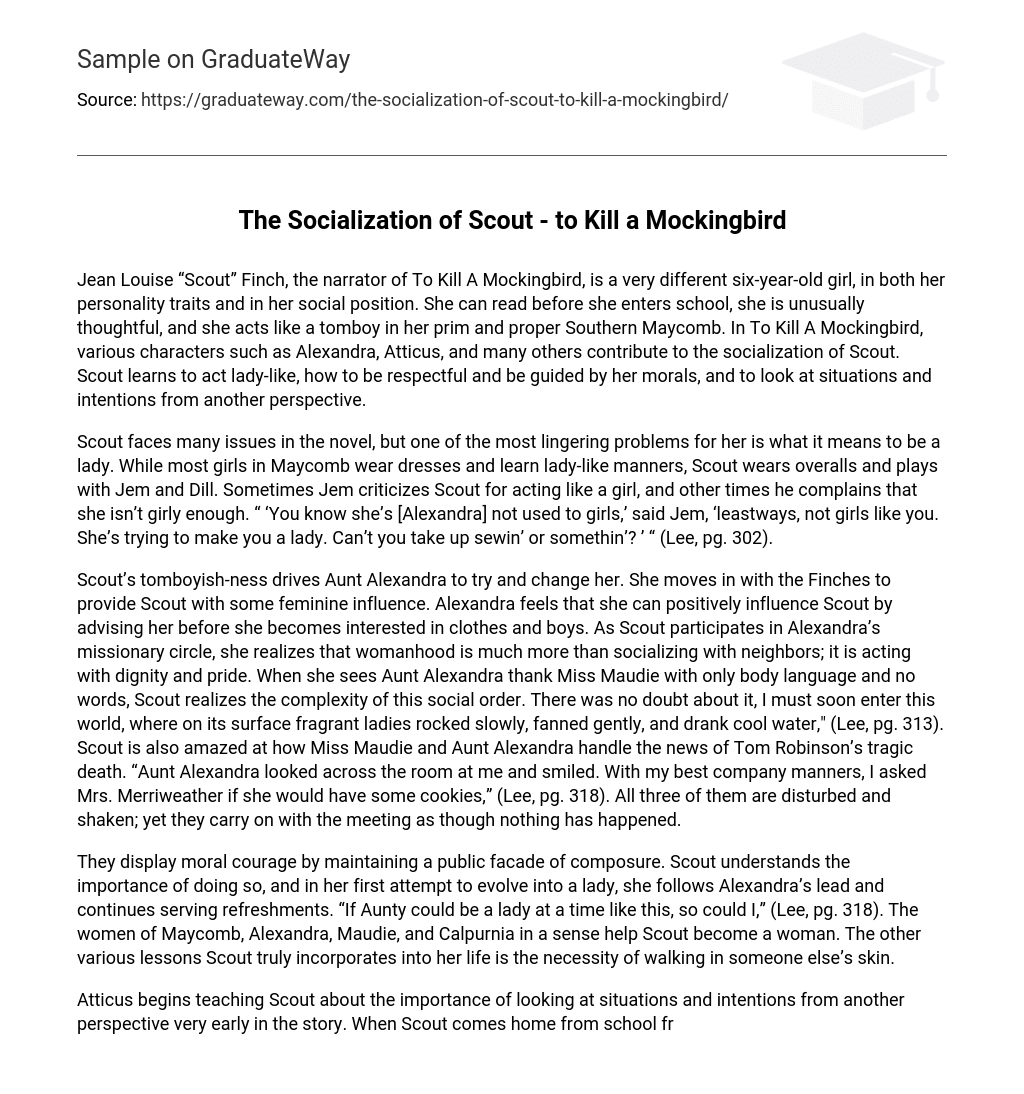The narrator of To Kill A Mockingbird is Jean Louise “Scout” Finch. Scout is a unique six-year-old girl, standing out in both her personality traits and social position. Before even starting school, she possesses the ability to read. She exhibits an unusually thoughtful nature and defies traditional gender roles by behaving like a tomboy in the prim and proper Southern town of Maycomb. Throughout the novel, various characters such as Alexandra and Atticus, as well as many others, play a role in shaping Scout’s socialization. She learns to behave in a more lady-like manner, show respect, adhere to her morals, and consider different perspectives in various situations and intentions.
< p > Scout grapples with various challenges throughout the novel, but one persistent issue for her revolves around the concept of femininity. While the majority of girls in Maycomb dress in skirts and acquire proper feminine manners, Scout opts for overalls and engages in activities with Jem and Dill. At times, Jem criticizes Scout for behaving like a girl, while other times he complains that she lacks femininity. Jem mentions, “‘You know she’s [Alexandra] not accustomed to girls,’ said Jem, ‘or at least not girls like you. She’s attempting to transform you into a lady. Can’t you try taking up sewing or something?’” (Lee, pg. 302).< /p >
Aunt Alexandra moves in with the Finches to change Scout’s tomboyish behavior. She believes that she can positively influence Scout by advising her on clothes and boys before she becomes interested in them. As Scout takes part in Alexandra’s missionary circle, she learns that being a woman means more than socializing with neighbors – it means acting with dignity and pride. When Scout sees Aunt Alexandra express gratitude to Miss Maudie without using words, she realizes the complexity of societal expectations. She knows that she will soon have to enter this world where women rock slowly, fan gently, and drink cool water on the surface. Scout is amazed at how Miss Maudie and Aunt Alexandra handle the news of Tom Robinson’s tragic death. Despite their distress, they continue with the meeting as if nothing has happened, and Scout tries her best to behave politely by offering cookies.
They demonstrate moral courage through their ability to remain composed in public. Scout recognizes the significance of this, and in her initial endeavor to become a lady, she emulates Alexandra’s behavior and persists in serving refreshments. According to Scout, “If Aunty could exhibit ladylike behavior in such a challenging situation, then I could too” (Lee, pg. 318). The women of Maycomb, including Alexandra, Maudie, and Calpurnia, contribute to Scout’s transformation into a woman. Furthermore, Scout genuinely embraces the valuable lesson of empathizing with others.
Atticus introduces Scout to the concept of empathy and understanding different perspectives early on in the story. After Scout has a challenging first day at school with Ms. Caroline, Atticus advises her to try and see things from Ms. Caroline’s point of view. He explains that while Ms. Caroline had learned not to give something to a Cunningham, if Scout and Walter had put themselves in her shoes, they would have realized that it was an innocent mistake on her part.
According to Lee (pg. 39), it is unreasonable to expect someone to learn all of Maycomb’s customs in just one day, and we cannot blame them for not knowing better. Atticus acknowledges his own failures in this regard and proves his point through his interactions with various individuals. He remains unperturbed by Mrs. Dubose’s harsh words, Miss Stephanie Crawford’s malicious gossip, and even Walter Cunningham’s veiled threat towards him. Additionally, when Bob Ewell spits in his face, Atticus chooses not to retaliate because he recognizes that he has wounded Ewell’s pride.
Atticus accepts people because of his ability to empathize with them, as he is skilled at “climbing into other people’s skin and walking around in it” (Lee, pg. 39). By the end of the story, Scout is also able to imagine herself in Boo Radley’s situation, although simply standing on the Radley porch is sufficient for her (Lee, pg. 374). In To Kill A Mockingbird, characters like Alexandra and Atticus play a significant role in shaping Scout’s social development. Scout learns how to behave like a lady, the importance of respect and following her own moral compass, and the value of considering different perspectives.





